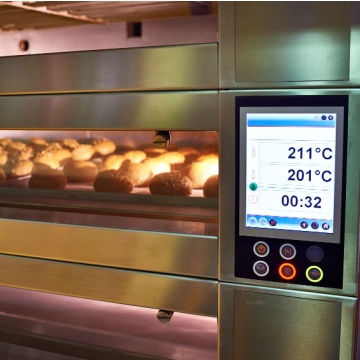Food-related businesses face many unique challenges because of the specific nature of the products they deal with. As food products are extremely sensitive to any fluctuations in temperature, effective temperature management is a must for maintaining the desired quality and safety of these products. This not only applies to food manufacturing, but also to food processing, storage, and transportation. Luckily, advanced temperature monitors available nowadays can make it super easy for businesses to manage temperature fluctuations throughout the food supply chain.
Without proper temperature monitoring and control, food products are extremely likely to get contaminated by bacteria and other microorganisms, leading to food-borne illnesses, legal consequences, and a complete loss of reputation for a business. This risk can only be eliminated by maintaining appropriate temperatures during food manufacturing, handling, processing, storage, and transportation.
Temperature management during storage and transportation is particularly critical to preventing spoilage. Frozen food items need extremely low temperatures to prevent them from thawing and potential bacterial contamination. Precise regulation of temperature is also essential during food processing activities such as sterilisation, roasting, baking, and cooking.
Understanding Temperature Monitoring Systems
A temperature monitoring system is capable of regulating and controlling the temperature of any specific environment. As soon as there are any temperature deviations, these systems send automatic alerts to users, which allow them to initiate corrective measures without any delay whatsoever. They automatically generate reports that can help analyse trends and make necessary changes. Also, there is no need for manual temperature checks because temperature monitors track temperature fluctuations and provide real-time updates to users. Based on the type of product, it is also possible to customise indicators for maximum and minimum thresholds.
Benefits in Food Logistics
The extraordinary features and capabilities of temperature monitoring systems can be incredibly useful in food logistics.
- Continuous recording of data allows the logistics managers to find out if any of the protocols have been compromised. This feature provides complete visibility during the transportation of the products without relying blindly on the drivers or handlers.
- Before the food products reach a specific destination, they go through many different steps and transportation checkpoints. All these steps can pose some danger to the products. Responsive notifications and alerts from temperature monitoring systems help recognise temperature differences and take steps to resolve the issue immediately.
- It also helps build statistical insights by collecting and storing data, which makes it easy to identify the loopholes and address them.
- Data generated by these systems can be accessed in real time from anywhere via a smartphone, tablet, or PC. Therefore, managers can keep a close eye on the team and their activities from a remote location.
Important Features
If you are looking for a temperature monitoring system for your food business, here are some of the features you should look for.
- The system of your choice must offer high accuracy because inaccurate information can complicate matters even further.
- It always makes sense to opt for a system that offers a long battery life.
- Temperature monitoring systems generate an enormous stockpile of data and therefore, you must choose one with sufficient storage capacity.
- Finally, your temperature monitor must be capable of wireless data transfer.
At ShockWatch, we offer a suite of temperature monitoring devices and systems that have been used by many food manufacturers with great results. Please contact us today to discuss your needs.


